
A recent Finnish research study suggests that a decline in biodiversity in the plants, animals and microbes in our daily environment may be linked to rising rates of allergies and asthma.
Researchers studied 118 Finnish teenagers and found links between a healthy immune system, growing up in more rural or natural setting, and the presence of certain skin bacteria.

Increasingly, scientists and researchers are realizing that we know less about many of the microbes that are in our environment, on our skin and inside our bodies. Nor do we know how they affect our health and bodily functions.
The authors of the study say that their results could support increasing biodiverse green spaces in cities, for our overall health. Maybe studies like this will help to emphasize the importance of biodiversity, even on the smallest scale.
To read more about this study and it’s implications:
“Rural teens less prone to allergies, study finds” an excellent summary of the study’s findings, by Susan Perry at the Minn Post.
Or a slightly more in depth break down of the science at Discovery News: Backyard Biodiversity May Stem Allergies
The original press release on ScienceDaily (links to the research article)